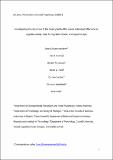Investigating the Robustness of the Illusory Truth Effect Across Individual Differences in Cognitive Ability, Need for Cognitive Closure, and Cognitive Style
Author(s)
De keersmaecker, Jonas; Dunning, David; Pennycook, Gordon; Rand, David G; Sanchez, Carmen; Unkelbach, Christian; Roets, Arne; ... Show more Show less
DownloadAccepted version (562.0Kb)
Open Access Policy
Open Access Policy
Creative Commons Attribution-Noncommercial-Share Alike
Terms of use
Metadata
Show full item recordAbstract
© 2019 by the Society for Personality and Social Psychology, Inc. People are more inclined to believe that information is true if they have encountered it before. Little is known about whether this illusory truth effect is influenced by individual differences in cognition. In seven studies (combined N = 2,196), using both trivia statements (Studies 1-6) and partisan news headlines (Study 7), we investigate moderation by three factors that have been shown to play a critical role in epistemic processes: cognitive ability (Studies 1, 2, 5), need for cognitive closure (Study 1), and cognitive style, that is, reliance on intuitive versus analytic thinking (Studies 1, 3-7). All studies showed a significant illusory truth effect, but there was no evidence for moderation by any of the cognitive measures across studies. These results indicate that the illusory truth effect is robust to individual differences in cognitive ability, need for cognitive closure, and cognitive style.
Date issued
2020Department
Sloan School of Management; Massachusetts Institute of Technology. Department of Brain and Cognitive SciencesJournal
Personality and Social Psychology Bulletin
Publisher
SAGE Publications